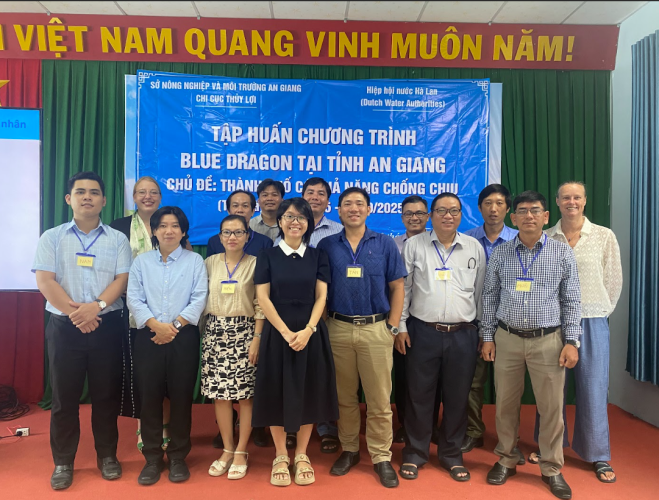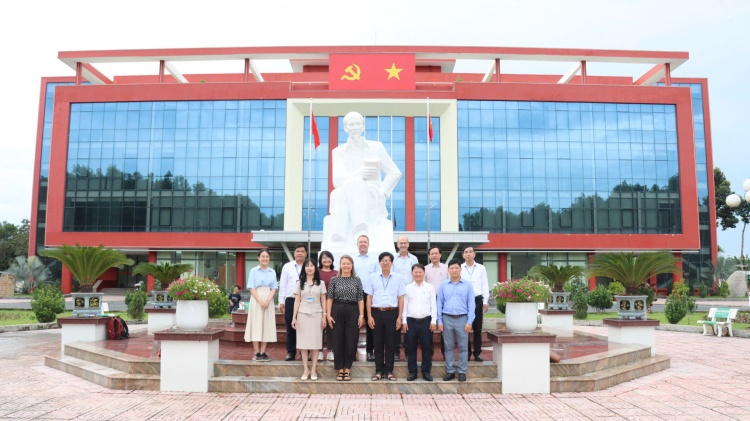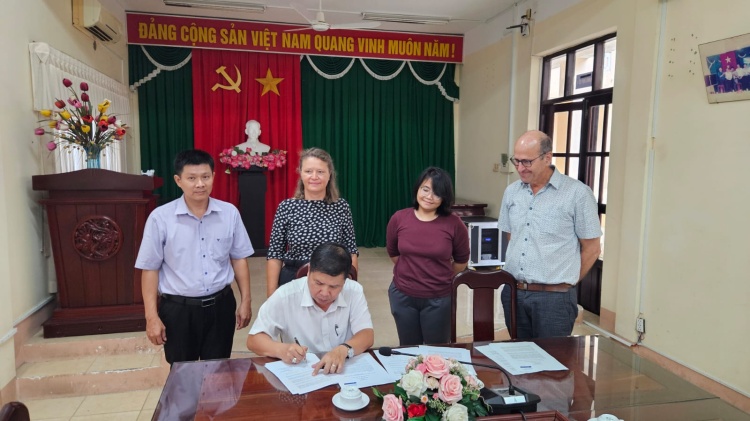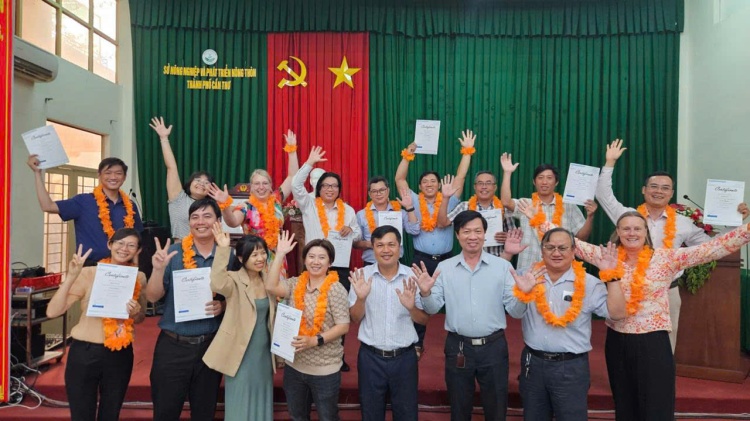
WEEK 4_POOL 4 CLIMATE ADAPTATION
SUMMARY OF THE BLUE DRAGON PROGRAM TRAINING
POOL 4 WEEK 4: CLIMATE CHANGE ADAPTATION
Within the framework of the Blue Dragon Pool, from October 20 to 23, 2025, the Blue Dragon Program Vietnam successfully organized a three-day training series in coordination with partners in the Mekong Delta (MD). The event was attended by officials from the Departments of Natural Resources and Environment of An Giang Province and Can Tho City, along with the Sub-Departments of Water Resources of An Giang Province and Can Tho City. The goal of this training week was to foster interdisciplinary cooperation, share professional knowledge, and collectively build a suitable Action Plan to address climate challenges in the regional context.
Day 1: A Reflection and Learning from the Dutch Approach
The opening day, October 20, was attended by 10 trainees, comprising officials and representatives from departments directly involved in resource management and climate change adaptation in Can Tho City and An Giang Province, including the Sub-Departments of Water Resources (An Giang & Can Tho), the Department of Construction, the Sub-Department of Mineral and Water Resources, the Sub-Department of Environmental Protection, and the Sub-Department of Sea and Islands of An Giang. On the part of the Blue Dragon Program, the training was led by Mrs. Anet Lablans and Ms. Denis Winters from the Netherlands Water Authorities, and Associate Professor Dr. Van Pham Dang Tri from Can Tho University.
The content of the first day focused on reviewing fundamental knowledge from previous weeks and determining the learning strategy for the entire Training Week on Pool 4. The learning process was structured through four specific steps. First, trainees and experts collaboratively analyzed and identified existing problems caused by climate change in the locality. Second, knowledge and experience were exchanged among the parties. Third, a draft action plan was co-developed to reflect community needs. Finally, a specific, feasible Action Plan was built to address the identified problems.
Through group discussions, key issues related to the impacts of climate change—such as extreme weather, heatwaves, drought, and flooding—were clarified. The Dutch experts presented adaptation solutions applied in their country, including increasing urban green spaces, applying eco-friendly materials, and implementing technical measures for ventilation and urban design to reduce heat. For the drought challenge, initiatives on water storage and river management were shared. Regarding flooding, the water reserve area solution was introduced. A critical viewpoint emphasized by the Dutch experts was that instead of attempting to completely control water flow, there is a need for appropriate planning schemes to adapt to and manage floods in a sustainable and safe manner.
.png)
Image: A Reflection and reviewing fundamental knowledge from previous weeks
(Source: Blue Dragon Program Vietnam)
Day 2: Multi-Criteria Selection Method, From the Netherlands to the Vietnamese Approach
The second day of the training series, October 21, focused on in-depth analysis and assessment of potential adaptation solutions proposed earlier. Under the guidance of the Dutch experts, trainees introduced and evaluated each solution based on an established multi-criteria analysis framework, which included ranking the criteria on a scale from 1 to 5. The objective of this systematic evaluation activity was to determine which options had the highest potential to contribute to the set goals while aligning with local prerequisites and available resources. This process helped eliminate less feasible options and form a group of “potential solutions” capable of delivering the highest effectiveness.
Notably, the training day also featured the participation of Assoc. Prof. Dr. Van Pham Dang Tri from Can Tho University, who provided analysis of the practical context in Vietnam. With his professional perspective on the Mekong Delta, Dr. Tri assisted in interpreting and adjusting the international approaches from the Dutch experts to ensure they were suitable and feasible within the specific environmental context of the region.
.png)
Image: The participants and trainers were working on the Dutch filtering solution approach.
(Source: Blue Dragon Program Vietnam)
Day 3: In-Depth Proposals and Field Survey
The third training day was dedicated to group work, where trainees from Can Tho and An Giang, along with the experts, focused on proposing specific solutions for local environmental challenges. The groups identified two key focal issues: the Can Tho group addressed urban flooding, while the An Giang group focused on erosion and drought in the U Minh Thuong area.
The proposed solutions demonstrated the effective application of the multi-criteria selection method guided by the Dutch experts. For the Can Tho trainee group, proposed urban flood management solutions included regular canal dredging, shifting to suitable cropping structures, and designing flexible pumping stations. For the An Giang trainee group, which focused on subsidence and erosion, the proposed solutions included planting soil-retaining trees to prevent erosion and building water reservoirs that support biodiversity conservation.
In the afternoon of the same day, trainees and experts conducted a field trip to Nam Yen Commune, An Giang Province, to directly observe the issue of saline intrusion. There, the group applied methods for data collection, practical surveying, and gathering feedback from local residents to better understand the environmental issues and the community's response. The next site visited was the Thu Ba Sluice Gate, an important irrigation structure built to control saline intrusion and protect the farming area of local people.
.png)
.png)
Image: The field trip for data collection at Nam Yen Commune, An Giang Province
(Source: Blue Dragon Program Vietnam)
Day 4: Summary Report and Action Orientation
The final day of the training series was a summary reporting session presented to local leaders. The trainee groups presented the knowledge, methods learned, and the proposed solutions developed throughout the three training days.
The reporting session was honored by the attendance and feedback of Mr. Nguyen Van Hai, Deputy Head of the Can Tho City Sub-Department of Water Resources, and Mr. Doan Van Hung, Deputy Head of the An Giang Sub-Department of Water Resources. After listening to the reports, the leaders provided practical feedback to refine and enhance the feasibility of the solutions. Provincial leaders also expressed their gratitude to the program for organizing such a meaningful training activity, which helped improve the capacity and knowledge of local officials in the field of climate change adaptation.
.png)
.png)
Image: The participants reported the learning results to the managers.
(Source: Blue Dragon Program Vietnam)
The Blue Dragon Program training Pool 4 Week 4 concluded successfully, and the experts and organizers of the Blue Dragon Program hope to reach a larger number of trainees in the future to create a strong ripple effect for the project.
.png)
Image: The participants and trainers, the managers took a wrap-up photo
(Source: Blue Dragon Program Vietnam)


